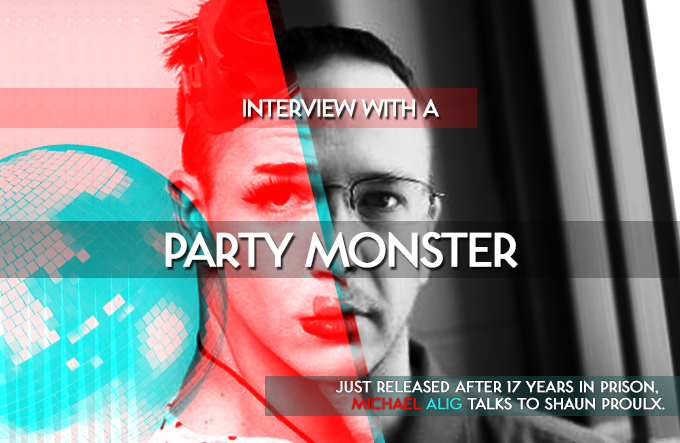EXCLUSIVE INTERVIEW :: Michael Alig was a young kid from South Bend, Indiana and he became, in the 80’s and 90’s, what many referred to as the King of the Nightlife Scene in New York. A co-founding member of the club, kids, he pleaded guilty to the killing of Andre Angel Melendez, in a confrontation over a drug debt that sent him to jail for seventeen years.
Alig was released in May, 2014 and spoke to GGN publisher Shaun Proulx on his SiriusXM radio show. Read the transcript or scroll down to hear the audio.
SP: You’ve been out of prison for less than a month. Las week on my show, I had Zack Phelps Roper – I don’t know whether you know him or not – but he is the grandson of Fred Phelps, who founded the Westboro Baptist Church, the “God Hates Fags” minister. He just left the church a few weeks ago, and I think of him now as I talk to you because he was like a fish out of water a little bit, and I’m wondering: how does it feel to be out of prison after seventeen years for you?
MA: It feels overwhelming, I mean, it feels like waking up after twenty years. I feel like I’m in another dimension. I’m in the city, but it’s not the same city. I look at the World Trade Center, and it’s not the same World Trade Center. I go to Times Square, and it’s not the same Times Square. It’s kind of like playing with my mind a little bit, but it’s extremely exciting. I feel like the first time when I moved to New York, it’s all brand new to me.
SP: I loved your Tweet. You said, “There’s this thing, called a Smart Phone?”
MA: Yeah, I’m talking on one right now. I’m in Harlem right now, down the street, talking on it.
SP: Do you think, “I missed so much being in prison?” Obviously, anyone who’s been in prison thinks that, but you were a club kid, an innovator, you missed out on a lot.
MA: I missed out on it physically. I read, I had visitors all the time, and I’m someone who reads, so I kept up that way. Obviously, I missed out on some things, but I whenever I catch myself thinking like that, I have to stop myself, and remind myself that I was there for a reason, and the family of the person that I killed, what are they missing out on. When I look at it that way, I look at it completely opposite. I am extremely fortunate to be here, and I thank God every day that I’m here.
SP: Is it easy for you to say the words, “The person that I killed”? I was in a cab on the way over here, and I thought, “this man is always going to be introduced as a convicted murderer.” What does that feel like?
MA: I have to remind myself every time I meet somebody. I know the kind of person I am, I know what’s going on inside my brain, and inside my heart, so it’s really hard for me to wrap my head around the fact that when people initially meet me, that’s probably the first thing that they think about, probably anybody, but it’s really good that I have to face it, when people get to know me, they didn’t know me before to say you aren’t the person we heard about or read about, or saw it in a movie. I’ve got a cross to bear, but it’s my cross to bear.
SP: Describe for us, in as many words as you wish, who was the boy who murdered Angel Melendez, in what you said was a “silly, pushy cat fight”. I know that it’s not the man that I’m talking to now. Describe the boy.
MA: A drug addict. A scared, lonely, selfish, self-centered, egotistical drug addict. I don’t even recognize that person, I see clips of myself in documentaries, and film footage from back then, and I don’t even recognize myself. I don’t want to sound like I’m blaming all of this on drugs, because ultimately, I made the decision to use drugs, so whatever I do on drugs is my responsibility, and I have to own up to that, but that being said, be it not for drugs, none of this would have happened. When I look at myself doing interviews, you see in my eyes, that I’m in another world, because at the time, I thought these drugs are making me very articulate, and I’m able to explain things that I normally wouldn’t be able to explain, and when I look at these talk shows, I barely talk at all, because I wouldn’t know what to say. I was just in another world, and only now, I’m clean and sober, I articulate what I read.
SP: I read that when the murder took place, you were high on Special K (Ketamine).
MA: Yes.
SP: I’ve been high on K before, and that is an out of body experience. It’s not a clear drug. I remember being in the clubs and doing some bumps and everything went digital, the guys on the dance floor.
MA: There were time issues, like seconds felt like eternity, and eternity felt like seconds, like everything was out of proportion, and I think that was huge part of what went wrong that day. Aside from being 2, 3, 4, 5 days, I don’t even remember. We were on crystal meth and cocaine and rohypnol and heroin and K. I can’t speak for the other people, but I misjudged the strength, or my own strength, or the duration of strength, because it was never anybody’s intention to kill anybody that day. We didn’t even know that he was dead after, or even hours after, we just thought that he was unconscious.
SP: I did a lot of reading before this conversation, so that I could honour the conversation, and I’ve got to say this for the listener: I’m not defending or condoning what happened.
MA: There is no justification.
SP: But you know, as a radio host, I’ll get some people riled up when I say the following: I may have not been in the same drug shoes as you, but in drug shoes, I could understand how this was something that went terribly, terribly wrong.
MA: Yeah.
SP: It was anybody’s nightmare.
MA: Have you ever taken Rohypnol?
SP: Yes I have, and meth as well.
MA: Do you remember anything?
SP: No.
MA: See, that’s the problem.
SP: You were so upset, that you guys injected heroin after the body started to smell, several days later. You put it in a tub, you put ice on it, but then you couldn’t keep it anymore, so you shot up with heroin and then chopped the body up. Is it correct to say that you had to get that high again to do what you had to do?
MA: Oh, absolutely. You said you did Ketamine, have you ever done heroin?
SP: No, that’s the one that I haven’t done.
MA: Opiates make you think that everything is ok, when it isn’t, it’s like a very powerful Xanax. No matter what the stress or anxiety is, you take a couple of bottles of Xanax, and your problems just float away, and opiates are the same. We knew that something had to be done at this point of 8, 9, 10 days later, I don’t even remember. We knew we couldn’t call the police, we were in no frame of mind to call the police. The police weren’t our friend, we were afraid of them, to be honest, and we knew that we had to do some kind of drug, and do a lot of it until we could get to the point, to face the reality of what we did and what, we felt at the time, needed to be done. There is no justification for what we did even afterwards. I don’t want to make it sound like I am trying to justify. That was what was going through my head at the time.
SP: I understand that you said you hoped that you would overdose on heroin so that this would all be over.
MA: Yeah, I did. Again, that was just the selfish drug addict mentality, of “forget it, I’m just going to leave the world and take my playing piece off the game board, and let other people deal with the problem”. At the time, and as selfish as it sounds, yes, that seems like an easier solution. That’s what drug addicts do, they’re use to taking the easy way out, they’re use to running away, and covering things up, and making things better, and that’s what I was thinking at the time.
[soundcloud url=”https://api.soundcloud.com/tracks/153899237″ params=”color=ff5500&auto_play=false&hide_related=false&show_comments=true&show_user=true&show_reposts=false” width=”100%” height=”166″ iframe=”true” /]
SP: How old were you when all this went down, Michael?
MA: I was almost 31. It happened in March, and I turned 31 in April.
SP: So you’re 48 now, ish?
MA: 48, yeah.
SP: Ok, so we’re around the same age. I understand, from a piece I read, that you wrote in the New York Post that says that you look back upon the time you spent in prison, with shame and disgust.
MA: Yeah, there’s no other way to look at it. It was horrendous, senseless, pointless crime that took place. A human life that’s lost, it’s gone now. Because of me, my stupidity, my selfishness, my self-indulgence, how else can you look at it?
SP: I want to add a layer into that because I’ve it before, and I’ve been doing my research, and I know what it’s like to come to a big city, gay, fall into the club scene, one of the things you said about the club scene when you first arrived into it, was my experience too, was very beautiful and positive, and you do some Ecstasy. It’s just wonderful, and there’s a lot of acceptance. You were saying earlier that you were blaming drugs for the murder you committed, that you committed the murder because you were really high on drugs, so there’s a whole trail that we can go all the way back to. You were just a kid who always wanted to be loved and accepted, and you were turning to any kind of avenue that you could to find that, and unfortunately, those avenues didn’t end up well for you. Do you see it like that way, because that’s how I’m connecting the dots when I look at your story?
MA: Yeah, that is how I see it, except for the end it didn’t turn out for Angel. Mine does. I’m still here, I could have very easily been the one who died that day, but I didn’t, so I have to look at it the other way that I’m here, and just be grateful and fortunate for it.
SP: I understand that you continued to drugs for awhile until 2009 while you were in prison.
MA: It’s true, it’s a selfish, self-indulgent, need that I had to blanket to mask everything. I committed this horrendous crime. I couldn’t face it. I couldn’t face the reality of what I had done. I couldn’t look at myself in the mirror, and I thought, when I go home, I’m going to be 48, and it’s too late to start over again, my life is going to be over, nobody will ever forgive me for what I did, I will never forgive myself for what I did, and that’s no way to live, so I might as well continue to using drugs, so I was getting high, so I would not have to deal with the reality of the crime I committed, and it wasn’t until my counselor sat me down in 2009, and she said, “The reason the media is saying these horrible things about you is because you continue to use drug even though you realize that you committed these awful crimes, and you’re on drugs, it makes you look like you don’t care.” The reality of course, was that I cared so much, that I couldn’t face it, or I thought I couldn’t face it. When she said that, everything clicked into place, I can’t believe I needed somebody else to tell me that, it was obvious that I put myself in other people’s shoes. My God, of course they are looking at me like that, of course they are looking at me like I don’t care, and that’s when I realized, whether it’s too late or not, I’ve got to stop, and I’ve got to go through the withdrawal, and I’ve to suffer some pain, because I was continuing to use drugs even though I was in prison. I wasn’t suffering like I should be, I was on drugs all the time, so just for myself, my self-worth, and my self esteem, I needed to stop using drugs, and the more painful the withdrawal, the better, because it would have been a cathartic pain, and it would have been, at the end of the day, or the end of the month, I would have felt better about myself. I was strong, I finally stood up and faced my responsibility and I’m beginning to pay for my crime. Nothing I ever do will pay for it completely, but I needed to go in that direction, I needed to stop masking everything, and that’s the message I think is so important here. I thought that it was too late I thought nobody could forgive me, I could never turn my life around, and I know it sounds pretentious, the minute I stopped using drugs, everything fell into place for me, my friends, more talented, creative people that were distancing themselves from me while I was on drugs, they’re all back, it wasn’t too late, they’re back, and I’ve got all these opportunities. I’m home now, it’s a beautiful scene in Central Park, it isn’t too late, it’s never too late.
SP: Are you tempted? I’m not sure where you’re at with your sobriety. Do you think you might be tempted to do drugs, now that you are out of prison?
MA: I was afraid that maybe that that might happen, before I left, walking past corner, that used to be drug spots. But it hasn’t happened so far, and I get such a rush now out of a sense of accomplishment at the end of the day for finishing a chapter in my book, or taking out the neighbor’s garbage, doing something really simple for somebody else. I just get such a rush out of that, I don’t want to do it with drugs.
SP: I asked you in the first segment about who the boy was, who committed the crime that you did. Who is the man now, how would you describe yourself now?
MA: The man I am now is a work in progress, and going in the direction that he needs to go in, in order to be of use to other people, in order to be of some use to somebody, to make somebody’s life better. It’s the beginning of what we started, the message was so powerful, so optimistic, and a lot of people said it’s superficial, and there was never something superficial about it. These 17 year old kids from Nebraska, who heard about the club, Kids, and heard about this place where they can go and be celebrated for their differences, instead of making fun of or beaten up. That kind of thing is life-changing, and I really want to give back to that, it’s the kind of service that I’m talking about. That’s who I am today, somebody who wants to go back to those roots, and somebody who is self-aware enough to know that it’s possible, and that I’m not this horrible person that the media says I was, because when I was arrested, I though the things that the media was saying about me, well, it must be true, if the media says it, but now I know myself more, to know I’m better than that.
SP: I think that’s the one thing that you’ve got to carry, and we were talking about this off the air. You have to carry that, and the knowing of who you are, is the only thing you’ve got, at the end of the day, and you lived in the media spotlight at a very young age, formative years, and that can really make one believe that that is the truth, and the only real truth is what you know in your heart.
MA: The funny thing is, when they said good things about me, I thought I must been fooled though. I thought ha ha, I tricked them, and then I thought, there must be something genius about people picking their changes, so maybe they were right about that.
SP: What would you say to a young Michael Alig today who was just getting to New York City for the first time? What would you say to him?
MA: You are your own greatest treasure, love yourself.
SP: What would you say to Angel today?
MA: Besides an extremely heart-felt apology, I would say, “Whatever the media is saying, or how we felt about you, because we may have said some things about Angel’s clothes, because he wasn’t cool, or the media jumps on we killed him because he wasn’t cool, I would want him to know that he was part of a family, and we thought of him as part of our family, and he was just another disenfranchised kid from New Jersey, just like the rest of us, and we bonded over that. He was like the new freak who every time we had a new freak join the group, we’d have a pity party, where they all say “One of us”. So in the club, Kids, we provided a family for each other, and I’d like him to know that he was part of that family.
SP: You’re not unique. There are some people who are glamorizing what you did, and glamorizing having killed someone, and when I Googled you, Twitter pops up, and someone tweets about you, and says, “I want to meet Michael, and I want to be like him, I want to be a murderer” What do you say to that?
MA: Someone tweeted that? It was probably sarcasm, I do not believe anybody would mean that, and if they did, I would say they would have some serious Psychological problems.
SP: That’s what you would say.
MA: Yeah.
SP: What would you want the world, listening to this right now, we have millions of subscribers across Canada and the States that are listening right now, what would you want them to know about you?
MA: I want them to know I absolutely have remorse and feeling. I care about what I’ve done, and I would like them to know that I am not this macho “Party Monster” and that is portrayed in the movie, there are so many things in the movie and the documentary that were absolutely not true, and even in the documentary, is very disingenuous clips that make me out to be something that I’m not.
SP: I got it. I wish you the best, I feel empathy, and I feel like you’ve got a whole life ahead of you, and I do believe in forgiveness, and I believe everybody deserves a second chance, and hope you find yours. I know you’re writing a book, you are most welcome to come back on my show whenever that’s out.
MA: I appreciate that.
SP: Michael, I wish you all the best.
MA: Thank you for talking, thank you for having me.






